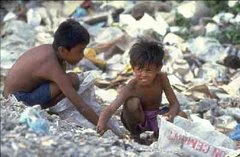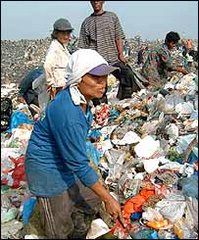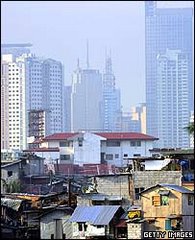I sometimes pass by Rosales and see that so little has changed. The people are the same, victims of their own circumstances as Old David, Angel, Ludovico, and even Father had all been. God, should I think and feel, or should I just plod on and forget? I know in the depths of me that I'll always remember, and I am not as tough as they were. Nor do I have the humor and the zest to cope as Tio Marcelo did, looking at what I see not as an apocalypse but as revelation; as he said once, paraphrasing a Spanish poet, he was born on a day that God was roaring drunk.
I think that I was born on a day God was fast asleep. And whatever happened after my birth was nothing but dreamless ignorance. But there was a waking that traumatized, a waking that also trivialized, because in it, the insolence and the nastiness of human nature became commonplace and I grew up taking all these as inevitable. In the end, the satisfaction that all of us seek, it seems, can come only from our discovering that we really have molded our lives into whatever we want them to be. In my failure to do this, I could have taken the easy way out, but I have always been too much of a coward to covet my illusions rather than dispel them.
I continue, for instance, to hope that there is reward in virtue, that those who pursue it should do so because it pleases them. This then becomes a very personal form of ethics, or belief, premised on pleasure. I would require no high-sounding motivation, no philosophical explanation for the self, and its desires are animal, basic - the desire for food, for fornication. If this be the case, then we could very well do away with the church, with all those institutions that pretend to hammer into human being attributes that would make him inherit God's vestments, if not His kingdom.
But what kind of man is he who will suffer for truth, for justice, when all the world knows that it is the evil and the grasping who succeed, who flourish, whose tables are laden, whose houses are palaces? Surely he who sacrifices for what is just is not of the common breed or of an earthly shape. Surely there must be something in him that should make us beware, for since he is dogged and stubborn as compared with the submissive many, he will question not just the pronouncements of leaders but the leaders themselves. He may even opt for the more demanding decision, the more difficult courses of action. In the end, we may see him not just as selfless but as the epitome of that very man whom autocrats would like to have on their side, for this man has no fear of heights, of gross temptations, and of death itself.
Alas, I cannot be this man, although sometimes I aspire to be like him. I am too much a creature of comfort, a victim of my past. Around me the largesse of corruption rises as titles of vaunted power, and I am often in the ranks of princes, smelling the perfume of their office. I glide in the dank, nocturnal caverns that are their mansions and gorge on their sumptuous food, and I love it all, envy them even for the ease with which they live without remorse, without regret even though they know ( I suspect they do) that to get to this lofty status, they had to butcher - perhaps not with their own hands - their own hapless countrymen.
Today I see young men packed off to a war that's neither their making nor their choice, and I recall Angel, who is perhaps long dead, joining the Army not because he was a patriot but because there was no other way. So it has not changed really, how in another war in another time, young men have died believing that it was their duty to defend these blighted islands. It may well be, but the politicians and the generals - they live as weeds always will - accumulating wealth and enjoying the land the young have died to defend. This is how it was, and this is how it will be.
Who was Don Vicente,after all? I should not be angered then, when men in the highest places, sworn to serve this country as public servants, end up as millionaires in Porbes Park, while using the people's money in the name of beauty, the public good, and all those shallow shibboleths about discipline and nationalism that we have come to hear incessantly. I should not shudder anymore in disgust or contempt when the most powerful people in the land use the public coffers for their foreign shopping trips or build ghastly fascist monuments in the name of culture or of the Filipino spirit. I see artists - even those who cannot draw a hand or a face - pass themselves off as modernists and demand thousands of pesos for their work, which, of course, equally phony art patrons willingly give. And I remember Tio Marcelo - how he did not hesitate to paint calesas and, in his later years, even jeepneys, so that his work would be seen and used, and not be a miser's gain in some living room to be viewed by people who may not know what art is. I hear politicians belching the same old cliches, and I remember Tio Doro and how he spent his own money for his candidacy and how he had bowed to the demands of change. When I see justice sold to the highest bidder I remember Tio Baldo and how he lost. So honesty, then, and service are rewarded by banishment, and people sell themselves without so much ado because they have no beliefs - only a price.
I would like to see all this as a big joke that is being played upon us, but I have seen what was wrought in the past - the men who were destroyed without being lifted from the dung heap of poverty, without recourse to justice.
But like my father, I have not done anything. I could not, because I am me, because I died long ago.
Who, then, lives? Who, then, triumphs when all others have succumbed? The balete tree - it is there for always, tall and leafy and majestic. In the beginning, it sprang from the earth as vines coiled around a sapling. The vines strangled the young tree they had embraced. They multiplied, fattened, and grew, became the sturdy trunk, the branches spread out to catch the sun. And beneath this tree, nothing grows!
Subscribe to:
Post Comments (Atom)








No comments:
Post a Comment